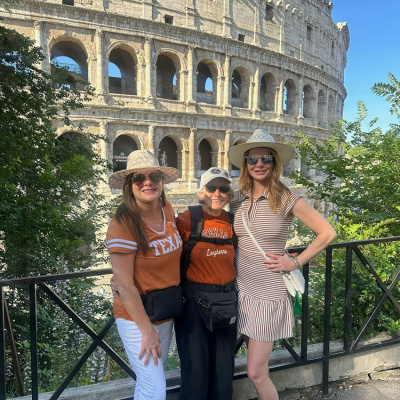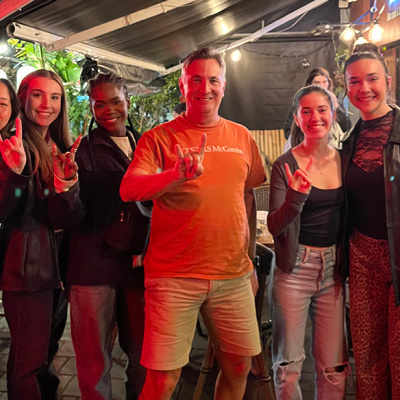Alumna Kayleen Schaefer on Her Debut Book 'Text Me When You Get Home'
Journalist Kayleen Schaefer’s new book looks at modern female friendship and what makes it so special.

Over the course of just one weekend I found myself saying, “Text me when you get home” to five different female friends. It’s a farewell that has become so common between women that it often replaces the word “goodbye.” That’s why journalist Kayleen Schaefer, BA ’00, titled her debut book Text Me When You Get Home: The Evolution and Triumph of Modern Female Friendship. A memoir combined with 100 interviews with women in their 20s to 80s, Schaefer’s book analyzes the bonds women create and looks at the history of female friendship, from the Middle Ages to Broad City and Bridesmaids. Schaefer spoke with the Alcalde about her book, her best friend, and the power of female friendship.

What all does it mean when women say “text me when you get home?”
At first I was like, “I say that. I like it. But does it really say female friendship?” So I kept asking my sources, strangers, friends—and everyone said they say this. When women say this, it is not just about safety—it’s about solidarity. It’s saying, “I’ve been the one walking by myself to a car in an empty parking lot or sitting in a cab thinking that the driver is talking too much.” It’s a way of telling your friends that you know how this is and you’ll be there for her whenever she needs you. And it’s something only female friends really say to each other.
It’s like another way of saying “I love you” at the end of a phone call.
Yeah, it’s another way of saying “I love you, too.” It’s absolutely that. It’s like a special code that women kept between themselves for a long time.
What compelled you to write this book?
Two things. One is I grew up just north of Dallas-Fort Worth in Grapevine, Texas, and from middle school onward it felt like women were supposed to compete with each other. With my friends it was about who was prettier, who got better grades, who could get a boyfriend—we were friends but also always eyeing each other. By the time I got to my 30s, I realized that isn’t how I relate to women anymore. The women who are my friends are my biggest support system. They are responsible for my well-being and my everyday joy, and I wanted to write about that shift. The second thing is that I know so many people who value their female friendships and who think these friendships are as important as any other relationship in their life.
How have portrayals of female friendship in media changed in recent years?
As far as its portrayal in pop culture, I think the big difference is women are finally the people telling these stories. They’re in charge of these stories. By no means are women fully represented in Hollywood yet, but there are women that are creating these shows and have power over what’s being put out there now. They’re executive producers, writers, and directors and that’s part of the reason we’re seeing these friendships as we actually experience them.
What’s special about friendship between women?
I always want to be careful not to knock friendships with men because I think those are important, too. But there’s a feeling when you’re with your female friends that everybody gets each other. It’s a sense of safety and security that you can say what you need to and no one will judge you. It’s like a sigh of relief.
Your best friend Ruthie makes a regular appearance in the book. What does her friendship mean to you?
Ruthie is my best friend, my soul mate, and she is amazing. When I asked her, kind of nervously, if I could write about her—maybe even using a false name—she was like, “Kayleen. There is no identity I am prouder of than being your best friend.” Then there are so many women I write about, like my Scandal club, which is this group of five other women and me. I have so much admiration for these women. As I watch them run their lives, I find them so impressive.
You interviewed 100 women for this book. What did you take away from them?
Everybody taught me something. I was a little surprised by how much women wanted to talk about their friendships. Mostly everyone was like, “Finally, I’m so glad you’re writing this.” It was like a jar opening. People were so excited to talk about their friendships in serious ways.
What has been the response from your female friends?
I didn’t know what to expect. Ruthie threw me a party at her apartment and invited our close friends so everyone could get an [advanced reader copy]. My friends’ response was just so overwhelming and positive, and I didn’t expect to strike that chord. Of course they’re my friends, but it felt genuine and it meant a lot to them. And now that I’m getting response from outside, it’s the same and it’s been amazing.






